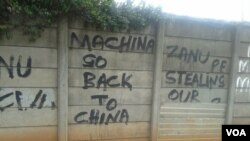CHINHOYI —
Graffiti is generally used in many countries by artists and political activists to express underlying social and political messages and is a form of artistic expression based upon spray paint styles.
Chinhoyi University of Technology Art lecturer Julius Nyamubaya says the emergence of graffiti of late is a clear testimony of lack of freedom of expression in the country and a deficiency of confidence in people’s protection after expressing oneself.
Nyamubaya says graffiti, which is common in Europe, is un-African but is fast catching up in the southern African region with artists in Mozambique using the form of art to deal with post-civil war consequences. Some use images on walls, written words and spray paintings and other tools.
Nyamubaya says graffiti known as “protest art” is quick art that can be done by anyone and is nobody’s art that is synonymous with the oppressed.
Chinhoyi University of Technology final year student Mavis Pakamisa says there is always a desire in her to communicate to the people and the society about something different.
Mavis says she grew up in a community where children, let alone the girl-child, were not allowed to be heard.
She admires graffiti artists for using it to express themselves.
Political activists Englebert Mashuma says he was forced to use graffiti to spread his party, the MDC-T’s policies, because of shrinking space in the country for them to openly reach ordinary people.
Psychologist Muchadei Mahove says graffiti messages are genuine and come from the heart.
But Nyamubaya is quick to warn that graffiti messages should not be regarded as the general thinking of the whole community.
Most of the graffiti in the cities is focusing on the July 31 national elections with some thanking if for forcing the Zanu-PF government and the Zimbabwe Electricity Supply Authority to cancel water and electricity bills, some backdating to 2009.
Some Zimbabweans are also using graffiti to express their anger at the treatment of workers by some Chinese companies in the country.
Chinhoyi University of Technology Art lecturer Julius Nyamubaya says the emergence of graffiti of late is a clear testimony of lack of freedom of expression in the country and a deficiency of confidence in people’s protection after expressing oneself.
Nyamubaya says graffiti, which is common in Europe, is un-African but is fast catching up in the southern African region with artists in Mozambique using the form of art to deal with post-civil war consequences. Some use images on walls, written words and spray paintings and other tools.
Nyamubaya says graffiti known as “protest art” is quick art that can be done by anyone and is nobody’s art that is synonymous with the oppressed.
Chinhoyi University of Technology final year student Mavis Pakamisa says there is always a desire in her to communicate to the people and the society about something different.
Mavis says she grew up in a community where children, let alone the girl-child, were not allowed to be heard.
She admires graffiti artists for using it to express themselves.
Political activists Englebert Mashuma says he was forced to use graffiti to spread his party, the MDC-T’s policies, because of shrinking space in the country for them to openly reach ordinary people.
Psychologist Muchadei Mahove says graffiti messages are genuine and come from the heart.
But Nyamubaya is quick to warn that graffiti messages should not be regarded as the general thinking of the whole community.
Most of the graffiti in the cities is focusing on the July 31 national elections with some thanking if for forcing the Zanu-PF government and the Zimbabwe Electricity Supply Authority to cancel water and electricity bills, some backdating to 2009.
Some Zimbabweans are also using graffiti to express their anger at the treatment of workers by some Chinese companies in the country.





